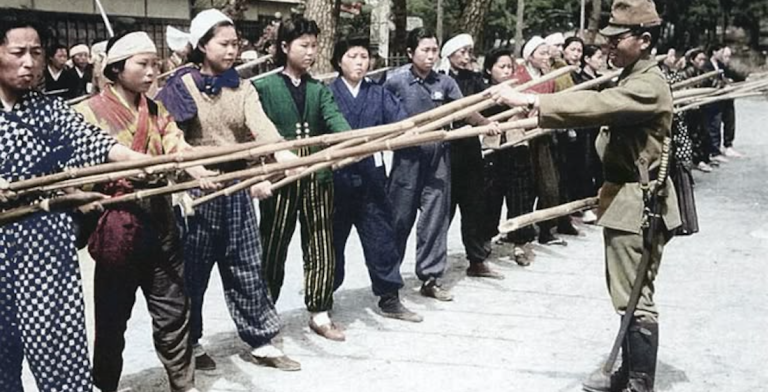
Facing Invasion, Nation Mobilizes Every Citizen Under Ancient ‘Bushido’ Code as Empire Crumbled

New York, N.Y. – The humid air of late July 1945 hung thick over the village of Higashimura, heavy with the scent of damp earth and impending doom. Cicadas screamed their shrill song, a jarring counterpoint to the grim silence that had settled over the rice paddies. Captain Kenji Tanaka, his Imperial Japanese Army uniform faded and patched, stood rigidly before a group of thirty women.
Their faces, etched with fatigue and fear, mirrored the exhaustion of a nation pushed to the precipice. In their hands, they clutched not rifles, but naginata – bamboo spears tipped with sharpened metal salvaged from farm tools. This was the stark reality of Ketsu-Go (Operation Decisive), the final, desperate plan to defend the Japanese Homeland, Nippon.
Captain Tanaka’s gaze swept over the assembly. These were farmers’ wives, mothers, grandmothers, schoolteachers – women whose lives had revolved around harvests and hearths, now thrust onto the front lines of a war hurtling towards their doorstep. The thunderous raids by B-29 Superfortresses were relentless, reducing cities to ash. Rumors swirled of a monstrous new American weapon used on Hiroshima just weeks prior.
The once-mighty Imperial Japanese Navy lay shattered on the ocean floor; the Kwantung Army in Manchuria was reeling. Defeat was a specter haunting every conversation, yet surrender remained unthinkable. The Bushido code, the soul of the warrior, demanded resistance unto death. It was a creed not confined to soldiers but deeply ingrained in the national psyche, a final bulwark against dishonor.
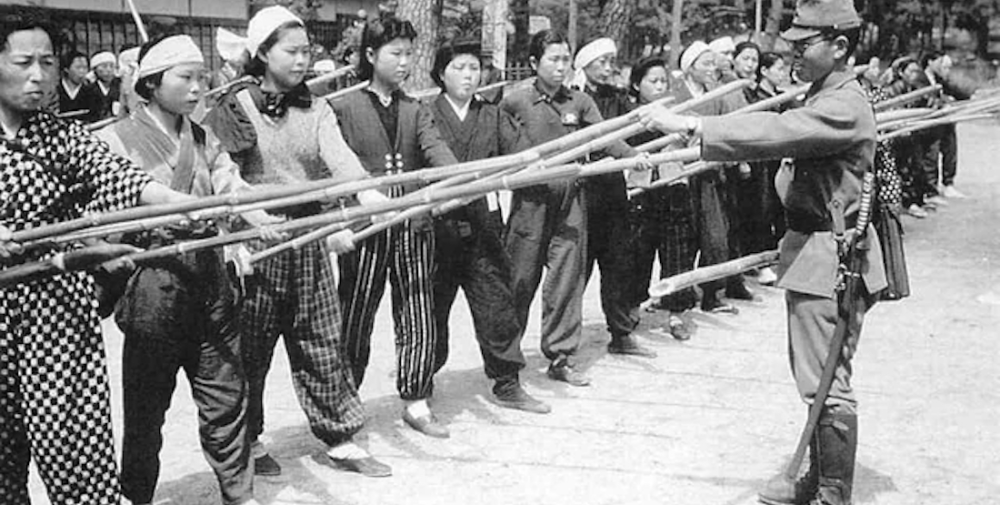
Forging Resolve from Bamboo and Belief
“Kiotsuke! Attention!” Tanaka’s command cut through the oppressive air. The women snapped stiffly, hands tightening on their bamboo shafts.
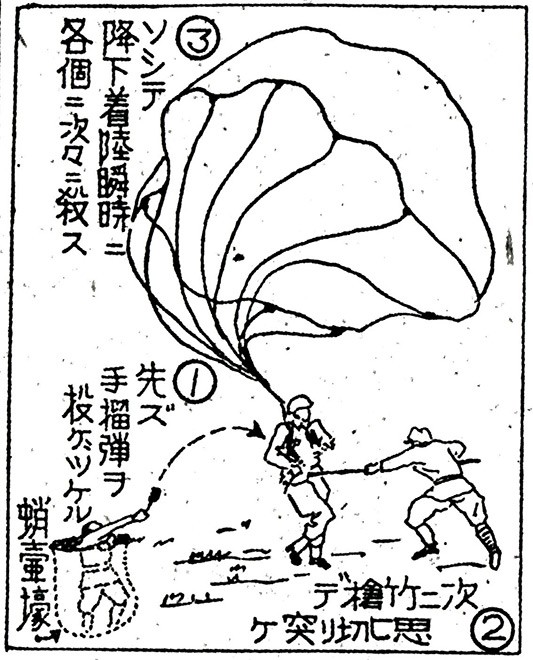
His voice, though strained, carried the authority honed in the brutal campaigns of China and the Pacific Theater.
“The enemy believes we are broken. They believe landing on our sacred soil will be simple. They are wrong!”
He paused, meeting their eyes one by one. “You hold more than bamboo. You hold the spirit of Yamato-damashii, the indomitable Japanese spirit. Your ancestors watch. Your children depend on you. Every thrust must be true. Every position must be held. We fight for the Emperor, for Japan!”
He demonstrated the basic stance – feet planted, body coiled, spear extended. “Sassei! Thrust! Not just with your arms, with your hara!” He struck his abdomen, the center of will.
“Channel your fury! Your despair! Make it your strength!” The women mimicked the movement, their initial attempts hesitant, clumsy.
Tanaka moved among them, adjusting a grip here, straightening a back there. He saw the calloused hands of labor, the deep lines of worry, the flicker of terror barely contained.
Yet, beneath the fear, he also sensed a terrifying resolve, a collective hardening born of utter desperation and cultural imperative.
This was Total War, where the distinction between combatant and civilian dissolved in the face of existential threat. The Home Islands were the final redoubt.
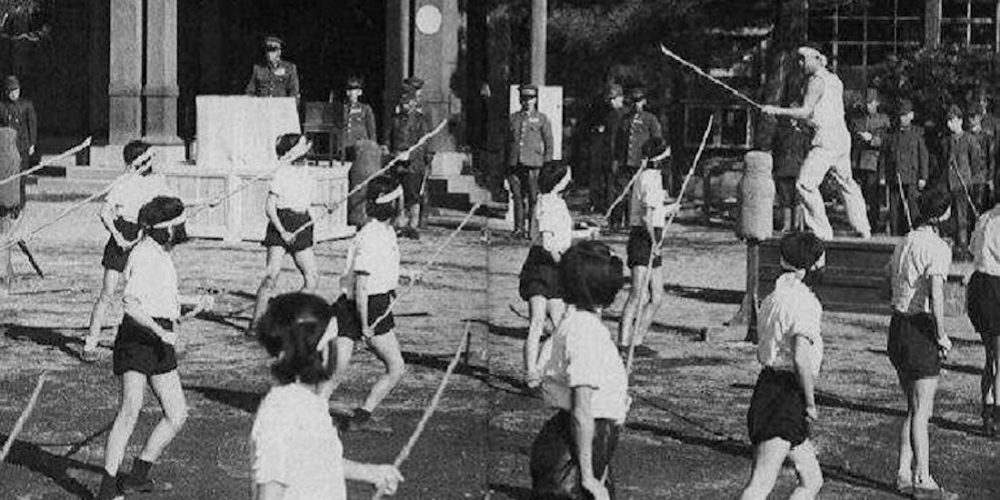
The Weight of Honor and Hopelessness
Among the trainees was Hana Sato, a widow whose husband had perished on the Philippine island of Leyte (Visayas). Her young son, Kaito, watched from the shade of a persimmon tree, his eyes wide. Each thrust Hana practiced felt like a physical manifestation of her grief and rage. The bamboo spear was absurdly light compared to the crushing weight of loss and the looming shadow of invasion.
She remembered Tanaka’s words during their first session: “Against tanks and machine guns, these may seem useless. But they are the weapon of spirit. One well-placed thrust into an enemy soldier climbing a ridge, one moment of sacrifice, can buy precious seconds for your neighbor, for your child.”
It was a chilling calculus of human cost, framed by Bushido‘s demand for honorable death over surrender. The National Spiritual Mobilization Movement had prepared them for this, in theory. The reality was visceral and bleak.
Training Grounds: Echoes of Ancient Ways
The training field was a patch of fallow land beside a Shinto shrine, its torii gate a silent witness. Drills were harsh, repetitive, conducted under the sweltering sun or in the eerie twilight after an air raid alert passed. Tanaka drilled them in ambush tactics – hiding in ditches, behind farmhouses, springing out to strike at close quarters.
He taught them to target vulnerable points: the throat, the eyes, the groin. “Speed! Surprise! Ferocity!” he barked. “They expect soldiers, not grandmothers! Use their surprise!” The women practiced until their muscles screamed, their palms blistered and raw. Chants of “Tenno Heika Banzai!” (Long live the Emperor!) punctuated their exercises, a ritual invocation of loyalty and defiance.
The simplicity of the bamboo spear became a symbol of their stripped-down existence, a return to primal defiance when modern weapons failed. It was a tragic echo of the Samurai spirit, now placed in the hands of the most vulnerable.
The Gathering Storm and Unseen Sacrifice
News filtered in slowly, grim and fragmented. Nagasaki had been struck by another unimaginable weapon on August 9. The Soviet Union had declared war, crashing through the depleted defenses in Manchuria. The Imperial General Headquarters in Tokyo issued increasingly frantic orders, demanding fanatical resistance.
Tanaka, privy to slightly more through his military liaison, felt the noose tightening. He looked at Hana, at the other women mastering their grim dance with the bamboo spears. Their courage was undeniable, forged in the crucible of firebombings and starvation rations.
Yet, the image of their fragile weapons against the mechanized might of the Allied Powers was a devastating juxtaposition. This mobilization was the ultimate expression of national will, yet also a testament to the catastrophic failure that had brought the Empire of Japan to this point. The sacrifice demanded was absolute, a final offering on the altar of a crumbling Imperial ideal.
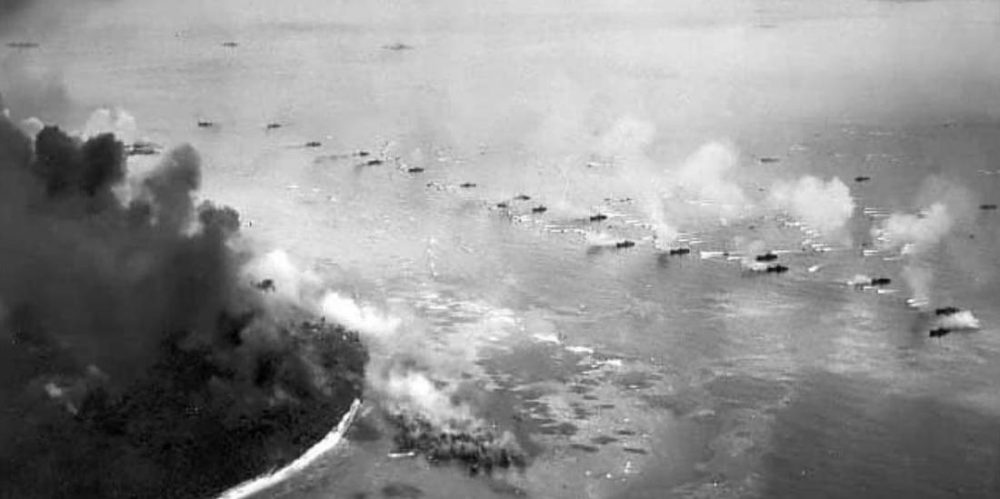
Whispers on the Wind: The Emperor’s Voice
On August 15, an unnatural stillness fell over Higashimura. Captain Tanaka was summoned to the village headman’s house where a rare radio crackled. The women, still clutching their bamboo spears, gathered outside, sensing a seismic shift.
Through the static, a voice, thin and unfamiliar, yet imbued with profound gravity, filled the air – the voice of Emperor Hirohito, the Tenno, speaking directly to his subjects for the first time. He spoke of enduring the unendurable, of accepting the Potsdam Declaration. The war was over. The word ‘surrender’ was never uttered, but its meaning crashed over them like a physical wave.
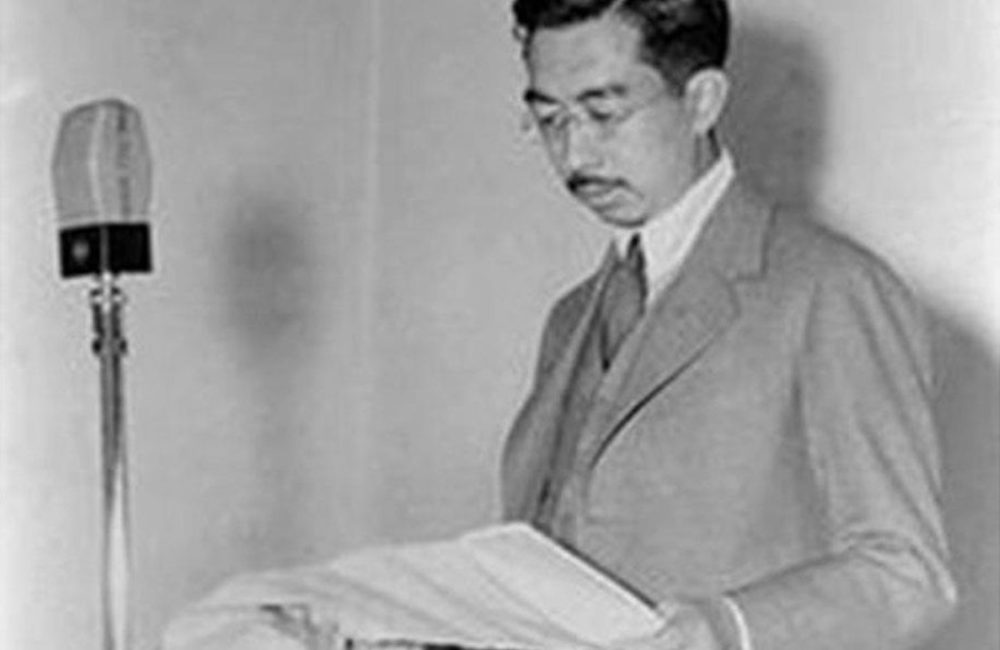
Tanaka stood frozen. The bamboo spear he had championed as a weapon of last resort suddenly felt unbearably heavy, absurd. The code of Bushido, which demanded death before dishonor, now collided with the divine command to live, to rebuild. He looked out at the women. Hana Sato’s spear clattered to the dust. Tears streamed down her face, not of joy, but of profound confusion and release.
The desperate courage they had summoned, the readiness to die for a patch of soil, was now transmuted into the staggering burden of survival. The bamboo spears lay discarded on the training ground, poignant relics of a defense that never was, symbols of a nation’s agonizing pivot from fanatical resistance to shattered peace. The Homeland was saved, not by spirit or spear, but by an unbearable truth delivered in an Imperial voice.
Bamboo Spirit Over Steel: Civilians Armed for Japan’s Final Stand (Aug. 1, 2025)
Summary
This story explores the desperate final months of Imperial Japan in 1945. Facing imminent Allied invasion after devastating defeats, the military mobilized civilians, including women, for a suicidal homeland defense codenamed Ketsu-Go. Lacking weapons, they trained with bamboo spears, embodying the Bushido spirit and the national resolve for total sacrifice. Captain Tanaka, a weary soldier, drills village women like Hana Sato, instilling ferocity born of despair. The narrative captures their grim preparation, the cultural weight of honor, and the shattering impact of the Emperor’s surrender broadcast, leaving their bamboo weapons as haunting symbols of an unwritten last stand.
#ImperialJapan #WWII #PacificWar #Bushido #KetsuGo #HomeFront #1945
#JapaneseHistory #BambooSpear #TotalWar #Surrender #EmperorHirohito
TAGS: World War II, Pacific Theater, Imperial Japan, Home Front, Civilian Defense, Ketsu-Go Operation, Bamboo Spear, 1945,
Bushido, Surrender of Japan, Emperor Hirohito, Japanese Military History, Women in War, Total War, Homeland Defense
